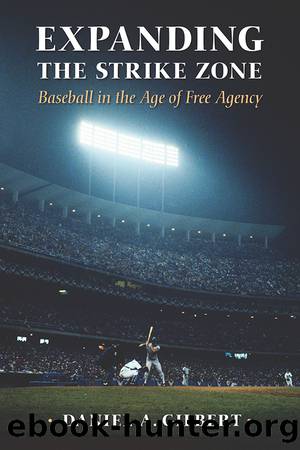Expanding the Strike Zone by Daniel A. Gilbert

Author:Daniel A. Gilbert
Language: eng
Format: epub
ISBN: 9781613763193
Publisher: INscribe
Published: 2013-08-15T00:00:00+00:00
Dominican winter baseball at Estadio Trujillo (later renamed Estadio Quisqueya), December 1959. (Hank Walker/Time & Life Pictures/Getty Images)
After Trujilloâs assassination in May 1961, the prospects for professional baseballâs survival in the Dominican Republic became uncertain. The 1961â62 winter season was forced to end prematurely, and the following season was canceled entirely as a result of the ongoing political turmoil. Without LIDOM in operation, many Dominican athletes sought opportunities in other Caribbean winter leagues.26 In addition, a number of top players participated in local exhibition games, placing those with MLB affiliations in conflict with the commissionerâs office for violating contractual rules regarding unsanctioned, âoutlawâ competition. In November 1962 the Dominican government sponsored three exhibitions, pitting a team of local players against a Cuban club. Felipe Rojas Alou, one of the Dominican stars recruited to participate, explains in his autobiography: âBecause of the political unrest in my land, the government felt that it had to try something to calm down the people.â According to Alou, when MLB commissioner Ford Frick got word of the planned games, he made it known that any MLB players found participating would be fined. Dominican president Rafael Filiberto Bonnelly intervened, proclaiming to concerned players (as Alou describes it), âI am the president . . . and I say that it is all right to play.â The games went forward as planned, drawing large crowds.27
In the wake of the exhibitions, commissioner Frick followed through on his threat, issuing fines to Alou, Marichal, and other MLB-affiliated participants. A standoff ensued, with the athletes refusing on principle to accept punishment for performing in such an important national cultural event. According to Alou, who became the most outspoken player in the dispute with the commissioner, Frick âhad no concept of the political consequences of the three-game series, nor did he have any idea that once the games had been set up there was no way the Dominican people would have permitted big leaguers from their country not to compete.â28 Faced with a challenge to his authority, Frick further escalated the confrontation, threatening banishment. âIf Alou doesnât care to pay the fine,â the commissioner announced, âhe will not play ball in this country.â29
Members of the U.S. sporting press lined up in support of Frickâs position, with some invoking racialized stereotypes in their reporting. Dismissively characterizing the protest as a ârhumba,â Joe King of the Sporting News described Alou as having âhis Latin blood firedâ over the matter.30 The Sporting News also published an editorial in support of the commissionerâs actions, suggesting that the Dominican exhibitions represented a self-serving distraction from the primary obligations of a big league ballplayer:
Ford Frickâs crackdown on wildcat Latin-American exhibitions is a warning to players that major league baseball is their primary business, with a paramount interest in their services. . . . No other business anywhere would allow its employees the freedom to disperse their efforts so widely. At times there is no dignity whatever, but only a seeming cynicism, in the rat-race by some big leaguers for an extra buck.
Download
This site does not store any files on its server. We only index and link to content provided by other sites. Please contact the content providers to delete copyright contents if any and email us, we'll remove relevant links or contents immediately.
Housekeeping by Marilynne Robinson(4438)
Papillon (English) by Henri Charrière(4265)
The Poetry of Pablo Neruda by Pablo Neruda(4100)
World without end by Ken Follett(3476)
TCP IP by Todd Lammle(3182)
Fluent Forever: How to Learn Any Language Fast and Never Forget It by Gabriel Wyner(3082)
The Rape Of Nanking by Iris Chang(2819)
How Proust Can Change Your Life by Alain De Botton(2811)
The Alchemist by Paulo Coelho(2690)
The Partner by John Grisham(2396)
Two lives by Helen Naylor(2297)
Hitler by Ian Kershaw(2195)
Yerma by Federico García Lorca(2063)
Sophie's World by Jostein Gaarder(2018)
Smilla's Sense of Snow by Peter Hoeg(1940)
Merriam-Webster's Pocket Dictionary by Merriam-Webster(1931)
Twilight of Idols and Anti-Christ by Friedrich Nietzsche(1893)
Il cavaliere inesistente by Italo Calvino(1855)
Deep Writing by Eric Maisel(1819)
